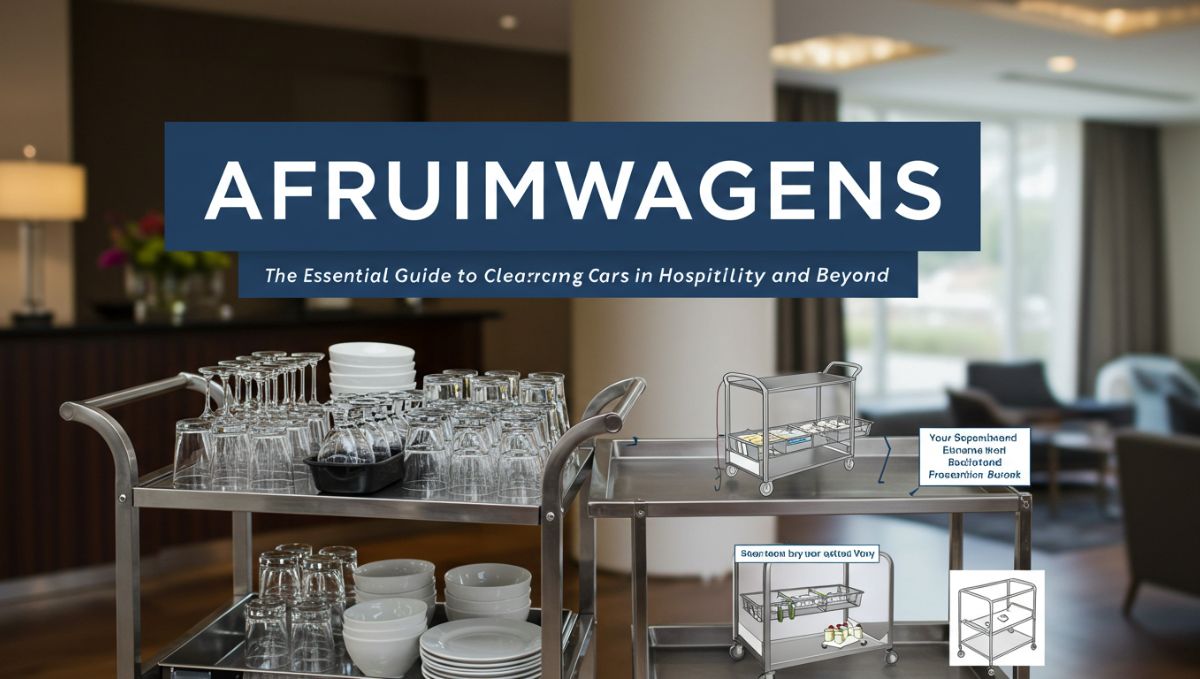In the fast-paced world of restaurants, hotels, hospitals, and large event venues, efficiency is everything. One of the most overlooked yet essential tools for smooth operations is the afruimwagen—a clearing cart designed to transport used dishes, trays, or supplies with ease.
Though simple in appearance, afruimwagens play a crucial role in saving time, reducing labor strain, and keeping environments clean and organized. This article explores everything you need to know about afruimwagens: their types, uses, benefits, and how to choose the best one for your needs.
What Is an Afruimwagen?
An afruimwagen is a specialized clearing or utility cart used to transport dirty dishes, glasses, or trays from dining areas to kitchens or dishwashing stations. They are also used to move clean items, linens, or catering equipment.
In hospitality, an afruimwagen ensures that tables are cleared quickly and that staff can focus more on guests rather than making multiple trips back and forth.
The Role of Afruimwagens in Different Industries
1. Restaurants and Cafés
-
Quick clearing of dishes during peak hours.
-
Maintaining a clean dining area for customer satisfaction.
-
Reducing staff workload by consolidating multiple trips.
2. Hotels and Catering Services
-
Transporting large volumes of dishes during banquets and events.
-
Moving food trays to and from rooms.
-
Organizing buffet setups and clean-ups.
3. Hospitals and Care Facilities
-
Collecting meal trays from patient rooms.
-
Transporting medical supplies and linens.
-
Reducing cross-contamination with hygienic, stainless steel carts.
4. Educational Institutions
-
Cafeterias in schools and universities use afruimwagens to handle hundreds of trays efficiently.
5. Large Events and Conferences
-
Clearing tables in record time during coffee breaks, gala dinners, or seminars.
-
Ensuring seamless service with minimal disruption.
Types of Afruimwagens
By Material
-
Stainless Steel Afruimwagens
-
Durable, hygienic, and easy to clean.
-
Ideal for hospitals and high-volume catering.
-
-
Plastic Afruimwagens
-
Lightweight and cost-effective.
-
Common in smaller restaurants or casual dining settings.
-
-
Aluminum Frame with Plastic Shelves
-
Combines strength with lightness.
-
Popular in catering due to easy mobility.
-
By Design
-
Open-Shelf Afruimwagens
-
Simple and functional.
-
Allow quick loading and unloading.
-
-
Closed-Cabinet Afruimwagens
-
Conceal dirty dishes for a more hygienic and polished look.
-
Often used in hotels or fine dining restaurants.
-
-
Tray-Return Afruimwagens
-
Designed for cafeterias where customers place trays directly onto carts.
-
-
Multifunctional Afruimwagens
-
Equipped with bins, drawers, or compartments.
-
Useful for sorting waste, dishes, and clean supplies simultaneously.
-
Benefits of Using Afruimwagens
-
Efficiency
-
Staff can clear more in less time, improving service flow.
-
-
Labor Savings
-
Reduces the need for multiple staff members carrying items manually.
-
-
Hygiene
-
Keeps dirty dishes out of sight and reduces contamination risks.
-
-
Safety
-
Prevents accidents caused by staff carrying heavy or stacked loads.
-
-
Professional Image
-
Organized clearing creates a more polished impression for guests.
-
Key Features to Consider When Choosing an Afruimwagen
-
Capacity – How many trays, plates, or bins does it need to hold?
-
Mobility – Look for carts with smooth-rolling wheels, brakes, and ergonomic handles.
-
Durability – Materials should withstand daily use and cleaning.
-
Noise Level – Rubber-coated wheels minimize noise in quiet environments like hotels.
-
Design Aesthetics – For open dining areas, carts should look clean and professional.
-
Ease of Cleaning – Smooth surfaces and removable parts help maintain hygiene.
Best Practices for Using Afruimwagens
-
Organize by Section – Dedicate shelves or bins to plates, glasses, and cutlery.
-
Do Not Overload – Prevent accidents by respecting weight limits.
-
Sanitize Regularly – Especially in hospitals and food service environments.
-
Train Staff – Ensure carts are pushed safely without blocking aisles or disturbing guests.
-
Use Multiple Carts – Large facilities benefit from having carts stationed in different areas.
Sustainability and Afruimwagens
Modern hospitality emphasizes eco-friendly practices. Afruimwagens contribute by:
-
Reducing water waste (fewer trips mean less pre-rinsing of small loads).
-
Encouraging waste separation with built-in recycling bins.
-
Being made from recyclable materials like stainless steel and durable plastics.
Some manufacturers now design green afruimwagens with sustainable production methods.
The Future of Afruimwagens
-
Smart Afruimwagens – Equipped with sensors to track fill levels.
-
Ergonomic Designs – Adjustable heights and handles to prevent staff injuries.
-
Noise-Free Wheels – For luxury hotels and hospitals.
-
Modular Systems – Allowing customization based on industry needs.
-
Automated Clearing Robots – The next step in replacing manual clearing.
Conclusion
Though often unnoticed by guests, afruimwagens are the backbone of efficiency in restaurants, hotels, hospitals, and event spaces. By streamlining the clearing process, they save time, reduce labor strain, improve hygiene, and maintain a professional environment.
From stainless steel hospital-grade models to sleek hotel carts and cafeteria tray returns, afruimwagens come in many forms—but their purpose remains the same: to keep operations clean, efficient, and guest-focused.
As industries evolve, so too will afruimwagens—adapting to meet modern demands for sustainability, automation, and design.

